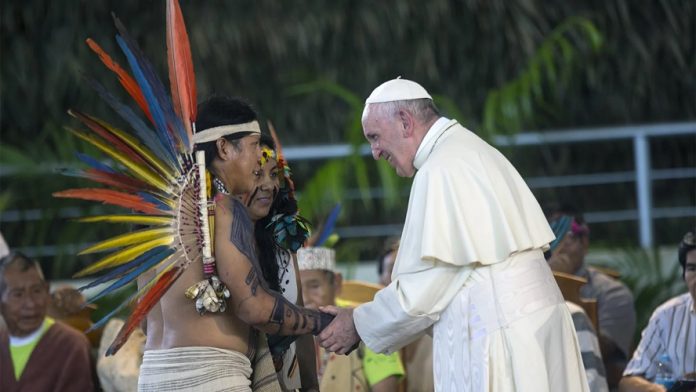The Rev. Thomas J. Reese, a Jesuit priest, is a Senior Analyst at RNS. Previously he was a columnist at the National Catholic Reporter (2015-17) and an associate editor (1978-85) and editor in chief (1998-2005) at America magazine. He was also a senior fellow at the Woodstock Theological Center at Georgetown University (1985-98 & 2006-15) where he wrote Archbishop, A Flock of Shepherds, and Inside the Vatican. Earlier he worked as a lobbyist for tax reform. He has a doctorate in political science from the University of California Berkeley. He entered the Jesuits in 1962 and was ordained a priest in 1974 after receiving a M.Div from the Jesuit School of Theology at Berkeley. The views expressed in this commentary do not necessarily represent those of BCNN1.
It was disappointing but not a surprise that Pope Francis decided not to respond to the Amazon synod’s recommendation that the Catholic Church ordain mature, married men to make up for the huge shortage of priests in the Amazon region. Francis did not say yes to married priests, but neither did he really say no. Discussion of the matter will continue, whereas previous papacies said no to even discussing the topic.
Priests are in such short supply in Amazonia that the Eucharist and other sacraments are not readily available to most Catholics. Many villages see a priest only once or twice a year. The shortage has gone on for decades and the Amazonian bishops, who met in Rome in October, see no hope for a turnaround.
They also wanted to open the deaconate to women, who in many villages are already the religious leaders of their communities. Here the pope gave a definitive no.
Francis responded to the recommendations of the synod in a 20-page exhortation, “Querida Amazonia” or “Dear Amazon,” which was released Wednesday (Feb. 12).
It is clear that Francis was upset with the media, who focused on the ordination of married men almost to the exclusion of the other topics of the synod, such as the devastation of the environment and exploitation of the indigenous peoples of the Amazon.
He lamented that the indigenous peoples “were considered more an obstacle needing to be eliminated than as human beings with the same dignity as others and possessed of their own acquired rights.” He also insisted that concern for the environment must be linked to concern for indigenous peoples.
While I sympathize with the pope’s desire to emphasize the issues facing the environment and indigenous peoples, I find it disappointing that he recycles the old recommendations of praying for vocations and enlarging the role of the laity.
Don’t get me wrong. I am all for these solutions, but we have been praying for vocations for more than a century and we have been increasing the role of the laity since the Second Vatican Council ended in 1965. True, more can be done, but are we going to be a Eucharistic community or not?
Clearly, Pope Francis does not want to be the pope who gets rid of mandatory celibacy, which he strongly values. He may also fear that vocal opponents to ordaining married men would further divide the church if he allowed it, even though they are a small minority.
“Querida Amazonia” eloquently acknowledges the absence of the Eucharist and the sacrament of reconciliation in so many places in the Amazon, but rather than ordaining married men, he urges the ordination of more male deacons. By accident or by plan, this will create the cadre of candidates for priesthood if he ever allows for exceptions.
But Francis is not open to ordaining women to the diaconate. His arguments against women deacons were disappointing and patriarchal. He fears “clericalizing” women — as if that is not a bigger problem for male deacons. He calls for more recognition of women’s roles in the church — and I agree — but why not go all the way and ordain women?
Source: Religion News Service
All Content & Images are provided by the acknowledged source



